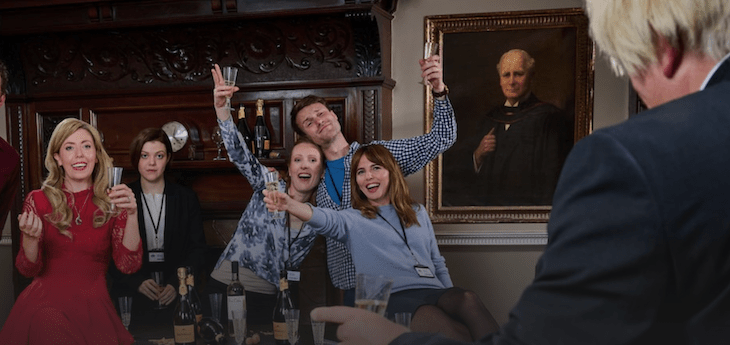Partygate has morphed from a half-forgotten scandal into a new drama-documentary which airs on Channel 4 tomorrow night. This rehash of old news depicts Boris Johnson as an amiable tyrant, played by Jon Culshaw, who presides over a gang of chaotic law-breakers as they hold riotous parties in Downing Street at the height of lockdown. The fizz of topicality has vanished from this story which came to an end last year when Boris was forced to relinquish the keys of Number Ten. So viewers already know whodunnit, why he dunnit, and what happened after he dunnit.
Still, the show has a decent stab at dramatising the nitty-gritty details. To create a sense of freshness, the script introduces us to a fictional intern, Grace, whose video diary follows her early days in Downing Street. Grace is a geeky misfit, a Cinderella figure (later seen tidying up after a lockdown party), who knows nobody in Number Ten and has very few contacts in London. How come? She’s from the north of England, apparently. This explains her wonky teeth and gormless manner. One of Boris’s upper-class hirelings asks about her background and she says, ‘I’m from Darlington.’ He squints at her in bafflement as if ‘Darlington’ were an obscure comet or a disused class of submarine.
The film is openly snobbish about Boris’s social origins and it alleges that he filled Downing Street with a preening crew of Bullingdon wannabes and arrogant, hard-drinking Hoorays. These fictional characters look like dropouts from a Richard Curtis film, and they answer to cod-Victorian names like Rory Baskerville and Josh Fitzmaurice.
Viewers already know whodunnit, why he dunnit, and what happened after he dunnit
At Number Ten, geeky Grace is befriended by an evil beauty, Annabelle, who warns her about the predatory habits of the upper-class rotters on the payroll. Boris’s acolytes treat their boss like a blonde messiah, following him slavishly around Downing Street, chanting ‘Boris! Boris!’ as he passes along the corridors. They howl uproariously when he favours them with an impromptu speech. ‘Don’t flatter me,’ he quips, ‘or I’ll become unbearable.’
As lockdown begins, the film unfolds like the famous baptism scene at the close of Godfather One. Deeds of infamy and acts of virtue are presented side by side for maximum impact. Pensioners in hazmat suits are shown cuddling their infant grandchildren. At the same time, revellers in Downing Street are spotted filling suitcases with cheap plonk from Tesco’s and dragging a ‘wine-fridge’ into the building. A grieving mother describes the final days of her cancer-ridden daughter who urged her relatives to stay away from her deathbed for fear that Covid might infect them. Meanwhile in Downing Street, the Hoorays are organising a ‘bring your own booze’ party and appointing a DJ to run the disco in the basement. The film itemises no fewer than 14 claret-soaked gatherings which were held to celebrate birthdays or to mark the end of a special adviser’s contract. Sometimes the guest-list included 200 names.
‘Is there anyone we don’t have a party for?’ asks Grace in astonishment. The wicked Annabelle explains how things work. ‘It’s not up to us to follow the rules…it’s not realistic.’ Later she warns Grace against blabbing to the press. ‘They make you pay a price if you ever cross them.’
Lockdown grinds on and the festivities move up a gear. The revellers get nasty. People are sick. Spilled claret stains the wallpaper. Fisticuffs break out on the dance floor. A fire-alarm is triggered by accident. Blameless members of Downing Street’s security staff are harassed and assaulted. Even baby Wilf’s playthings are vandalised by Boris’s clique of Brideshead wreckers. Each of these outrages is accompanied by a headline from a tabloid paper or by a quote from Sue Gray’s report which the film-makers use as ‘a route map’. Next morning, we watch as masked cleaners find discarded plastic sachets littering the floor. The suggestion is that coke-fiends were snorting Class-A drugs in the corridors of Downing Street.
The film leaves plenty of questions unanswered. It fails to mention the links between the Labour leadership and Sue Gray which led some to question the impartiality of her report. Nor do the film-makers explore a minor scene involving a senior mandarin, Sir Mark Sedwill, who walks into his wood-panelled office one morning and finds it trashed by overnight revellers.
‘Someone’s been dancing on my desk,’ he thunders at a pair of chastened party-goers. The implication is that Sir Mark knew all about the festivities but chose not to share the truth with his boss. Vindication for Boris.
The most worrying testimony comes from the victims of fines imposed by overzealous officials. A rebellious Yorkshireman decided to satirise lockdown by advertising a snowball fight via social media. The jape worked and dozens of fun-seekers converged on a frosty heath and pelted each other with wads of snow. The cops showed up too and hit the Yorkshireman with a £10,000 penalty. But how exactly did this stunt break the law? He can’t have known in advance whether his satirical effort would succeed or fail. And at what point does ‘a snowball fight’ become quorate and develop from a ‘socially distanced gathering’ into a life-threatening hazard that merits prosecution? The prankster is still struggling to discharge his debt.
The film won’t shift the dial on Boris’s reputation and it adds precisely nothing to our understanding of the pandemic. But it makes a powerful case for the lockdown criminals to be pardoned and compensated. And it may encourage the general population to defy the authorities if a fresh crackdown is ordered.







Comments